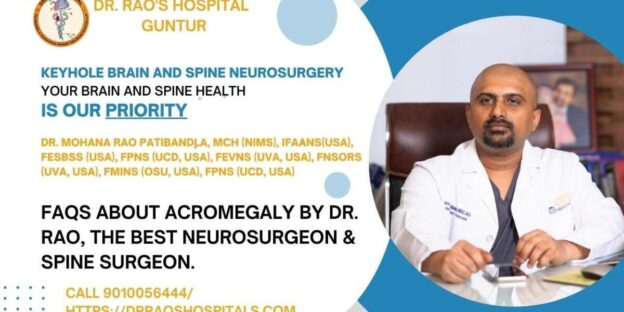Frequently Asked Questions About Acromegaly
Summary: Explore the intricacies of acromegaly and its treatment options through the eyes of Dr. Rao, a renowned pituitary tumor surgeon. Get valuable insights into this rare hormonal disorder and discover how Dr. Rao’s Hospital is pioneering advanced treatments.
Expert Insights on Acromegaly by Dr. Rao: Leading Pituitary Tumor Surgeon
What is Acromegaly?
Acromegaly is a rare hormonal disorder that results in the enlargement of bones, tissues, and organs in adulthood due to excessive growth hormone (GH) production.
What Causes Acromegaly?
Pituitary adenomas, which develop in the pituitary gland, are benign tumors that account for most acromegaly cases. These tumors secrete excess growth hormone.
What Are the Symptoms of Acromegaly?
Common symptoms include enlarged hands and feet, facial changes like a protruding jaw and enlarged nose, joint pain, fatigue, and thickened skin.
How Is Acromegaly Diagnosed?
Blood tests measure insulin-like growth factor 1 (IGF-1) levels and growth hormone. Imaging tests such as MRIs help locate pituitary tumors.
How Is Acromegaly Different from Gigantism?
Gigantism occurs in childhood due to excessive GH before growth plate closure, leading to excessive height. Acromegaly occurs after growth plate closure, resulting in bone enlargement.
Can Acromegaly Be Inherited?
In most cases, acromegaly is not inherited. It usually develops sporadically due to pituitary tumors.
What Complications Are Associated with Acromegaly?
Acromegaly can lead to serious health issues like cardiovascular disease, diabetes, joint problems, sleep apnea, and an increased risk of certain cancers.
How Is Acromegaly Treated?
Treatment aims to reduce GH production or block its effects. Options include surgery to remove tumors, medication to lower GH levels, and radiation therapy in some cases.
What Is Transsphenoidal Surgery?
Transsphenoidal surgery involves removing pituitary tumors through the nasal passages. It is a minimally invasive approach with shorter recovery times.
What Are the Medications Used for Acromegaly?
Medications like somatostatin analogs and growth hormone receptor antagonists lower GH levels and control symptoms.
Can Acromegaly Be Cured?
A complete cure is possible if the pituitary tumor is successfully removed through surgery. However, lifelong follow-up is essential.
How Does Acromegaly Affect Organs?
Excess growth hormone can lead to the enlargement of organs like the heart, leading to cardiovascular issues.
Can Acromegaly Affect Vision?
Pituitary tumors can press on the optic nerve, causing vision problems.
Is Acromegaly Life-Threatening?
If left untreated, acromegaly can lead to severe complications. However, with proper management, patients can lead healthy lives.
What Specialists Treat Acromegaly?
Endocrinologists, neurosurgeons, and sometimes radiation oncologists collaborate to manage acromegaly.
Can Acromegaly Be Prevented?
Prevention isn’t possible, but early diagnosis and treatment can prevent complications.
How Does Acromegaly Impact Quality of Life?
Untreated acromegaly can impact the quality of life due to physical changes and health issues. Effective treatment improves overall well-being.
Is Acromegaly Common?
No, acromegaly is a rare disorder, affecting about 3 to 4 people per million per year.
Are There Support Groups for Acromegaly Patients?
Yes, support groups provide information, resources, and a platform to connect with others facing similar challenges.
How Can I Contact Dr. Rao for Acromegaly Treatment?
For expert guidance and treatment, you can contact Dr. Rao, a skilled neurosurgeon specializing in pituitary disorders, at Dr. Rao’s hospital. Call 9010056444 or visit drraoshospitals for more information. Uncover the mysteries of acromegaly with insights from Dr. Rao, the leading pituitary tumor surgeon. Delve into treatment options and discover the excellence of Dr. Rao’s Hospital in neurosurgery. Your guide to understanding and conquering acromegaly awaits.

